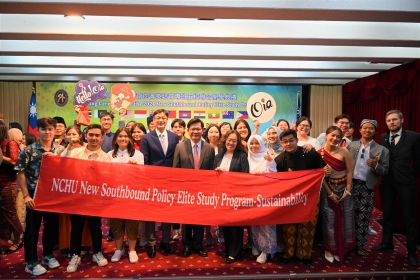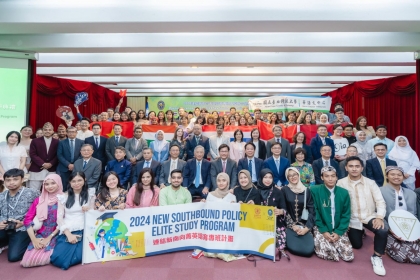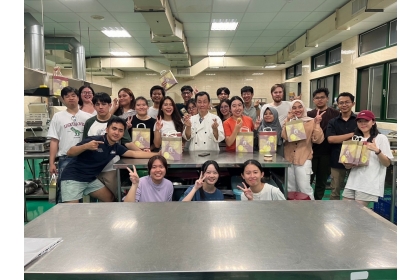National Chung Hsing University Joins the Ministry of Foreign Affairs' New Southbound Elite Study Program, Focusing on Sustainable Development and Climate Change Issues
2024-09-19
興新聞張貼者
Unit秘書室
1,796
Source:Office of International Affairs, NCHU
This year (2024), for the first time, National Chung Hsing University (NCHU) was invited by the Ministry of Foreign Affairs to join the "New Southbound Elite Study Program." NCHU will be responsible for the fields of sustainable development and climate change, becoming the fifth university in Taiwan to participate in this program. Through nominations from sister universities and promotions by foreign embassies, the program received enthusiastic applications from young talents in nine countries. Ultimately, 20 elite students from New Zealand, Australia, Vietnam, Indonesia, Thailand, and the Philippines were selected to study at NCHU.
During the orientation held by the Ministry of Foreign Affairs, NCHU Vice President Chang, Chao-Chin highlighted that sustainable development is a global concern. For these students from diverse professional backgrounds, NCHU has designed interdisciplinary courses and lectures, Mandarin language learning, and multicultural experiences. He expressed confidence that after five months of study and exchange, these 20 students from various countries would broaden their horizons, apply their learnings to their home countries, and become bridges of friendship between Taiwan and their respective nations. Vice President Zhang emphasized that although this is NCHU's first participation in the program, the university is confident in achieving results as remarkable as those of the other four universities involved.
The curriculum of this program is comprehensive and diverse. In addition to core professional courses, the Office of International Affairs has meticulously arranged a wide range of cultural activities, Mandarin language classes, and practical skills training, helping students explore Taiwan from multiple perspectives in a short time. To broaden students’ international perspectives and deepen their understanding of the Sustainable Development Goals (SDGs), the program includes a series of English-language SDGs workshops, inviting domestic and international experts to share practical experiences. These topics cover sustainable development issues such as international cooperation, education, climate action, marine ecosystems, and animal welfare. The goal is to provide students with a comprehensive and focused perspective, inspiring them to think and act on global sustainability issues.
NCHU's International College of Innovation and Industry Liaison has also tailored a "Mandarin and Traditional Culture and Skills" course for these 20 international students, combining intensive Mandarin learning with rich elements of traditional Chinese culture. Over the four-month course, students will have six hours of Mandarin learning per week and will experience diverse traditional cultural and artistic practices, including the four arts (Erhu, Go, calligraphy, and Chinese painting), tea ceremony, and Tai Chi. Through this immersive cultural learning, students will not only improve their Mandarin skills but also appreciate the profound depth and charm of Chinese culture.
NCHU is Taiwan's leading academic institution in sustainable agriculture and food technology. Through Taiwan's characteristic cuisine courses, students will have the opportunity to understand the integration of Taiwan's agriculture and culture. For instance, they will make mooncakes during the Mid-Autumn Festival to learn about the food traditions of significant festivals. Additionally, they will make Taichung’s famous sun cakes and pineapple cakes. These hands-on courses not only enrich the students' cultural experiences but also allow them to witness the practical applications of Taiwan’s sustainable agriculture. Through food and agricultural education, the program aims to promote cultural exchange and strengthen friendly relations between Taiwan and New Southbound countries.
Besides on-campus learning, the Office of International Affairs has organized rich cultural exploration activities, guiding students to visit places such as Yilan, Miaoli, and Tainan. These visits will help them understand Taiwan's diverse cultural landscape and natural scenery, offering inspiration for their academic research and bridging the gap between theory and practice.
The Office of International Affairs hopes that through this program, future leaders from New Southbound countries will be nurtured, thereby fostering substantial connections between Taiwan and these nations. The goal is to make significant contributions to the region's sustainable development. The program also aims to deepen the ties between Taiwan and New Southbound countries in the future, jointly facing global challenges and creating a brighter future together.
This year (2024), for the first time, National Chung Hsing University (NCHU) was invited by the Ministry of Foreign Affairs to join the "New Southbound Elite Study Program." NCHU will be responsible for the fields of sustainable development and climate change, becoming the fifth university in Taiwan to participate in this program. Through nominations from sister universities and promotions by foreign embassies, the program received enthusiastic applications from young talents in nine countries. Ultimately, 20 elite students from New Zealand, Australia, Vietnam, Indonesia, Thailand, and the Philippines were selected to study at NCHU.
During the orientation held by the Ministry of Foreign Affairs, NCHU Vice President Chang, Chao-Chin highlighted that sustainable development is a global concern. For these students from diverse professional backgrounds, NCHU has designed interdisciplinary courses and lectures, Mandarin language learning, and multicultural experiences. He expressed confidence that after five months of study and exchange, these 20 students from various countries would broaden their horizons, apply their learnings to their home countries, and become bridges of friendship between Taiwan and their respective nations. Vice President Zhang emphasized that although this is NCHU's first participation in the program, the university is confident in achieving results as remarkable as those of the other four universities involved.
The curriculum of this program is comprehensive and diverse. In addition to core professional courses, the Office of International Affairs has meticulously arranged a wide range of cultural activities, Mandarin language classes, and practical skills training, helping students explore Taiwan from multiple perspectives in a short time. To broaden students’ international perspectives and deepen their understanding of the Sustainable Development Goals (SDGs), the program includes a series of English-language SDGs workshops, inviting domestic and international experts to share practical experiences. These topics cover sustainable development issues such as international cooperation, education, climate action, marine ecosystems, and animal welfare. The goal is to provide students with a comprehensive and focused perspective, inspiring them to think and act on global sustainability issues.
NCHU's International College of Innovation and Industry Liaison has also tailored a "Mandarin and Traditional Culture and Skills" course for these 20 international students, combining intensive Mandarin learning with rich elements of traditional Chinese culture. Over the four-month course, students will have six hours of Mandarin learning per week and will experience diverse traditional cultural and artistic practices, including the four arts (Erhu, Go, calligraphy, and Chinese painting), tea ceremony, and Tai Chi. Through this immersive cultural learning, students will not only improve their Mandarin skills but also appreciate the profound depth and charm of Chinese culture.
NCHU is Taiwan's leading academic institution in sustainable agriculture and food technology. Through Taiwan's characteristic cuisine courses, students will have the opportunity to understand the integration of Taiwan's agriculture and culture. For instance, they will make mooncakes during the Mid-Autumn Festival to learn about the food traditions of significant festivals. Additionally, they will make Taichung’s famous sun cakes and pineapple cakes. These hands-on courses not only enrich the students' cultural experiences but also allow them to witness the practical applications of Taiwan’s sustainable agriculture. Through food and agricultural education, the program aims to promote cultural exchange and strengthen friendly relations between Taiwan and New Southbound countries.
Besides on-campus learning, the Office of International Affairs has organized rich cultural exploration activities, guiding students to visit places such as Yilan, Miaoli, and Tainan. These visits will help them understand Taiwan's diverse cultural landscape and natural scenery, offering inspiration for their academic research and bridging the gap between theory and practice.
The Office of International Affairs hopes that through this program, future leaders from New Southbound countries will be nurtured, thereby fostering substantial connections between Taiwan and these nations. The goal is to make significant contributions to the region's sustainable development. The program also aims to deepen the ties between Taiwan and New Southbound countries in the future, jointly facing global challenges and creating a brighter future together.




